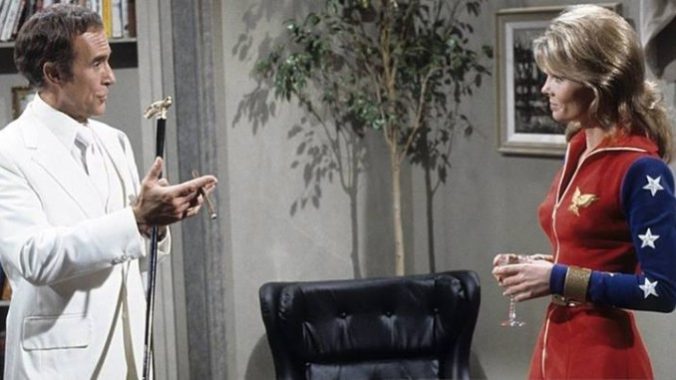Before Lynda Carter, a Wonder Woman TV Movie Took Away Her Powers

From 1969 to 1975, ABC put out weekly films. They functioned as TV pilots, testing grounds for up-and-coming filmmakers, and places for new and old stars to shine. Every month, Chloe Walker revisits one of these movies. This is Movie of the Week (of the Month).
While this column was birthed from a love of the ABC Movie of the Week, and a desire to highlight editions that are more thematically and/or artistically interesting than TV movies are often given credit for, the fact remains—they aren’t all winners. Even in the lesser examples, however, there’s usually a lot to enjoy. Case in point: 1974’s Wonder Woman.
In her first feature-length live-action adventure, the titular heroine was played by Cathy Lee Crosby: A former professional tennis player, and—prepare yourself—a blonde! That’s just the first of many ways in which the 1974 take on Wonder Woman, intended as a series pilot, diverges from all those that would follow.
Taking its cue from the “I Ching” era of the comic books, when Wonder Woman went powerless for several years, the 1974 MOTW imagines her as a spy rather than a superhero. Besides her blondeness, this iteration wears a more modest take on the famous costume, no-one gets the truth lassoed out of them, and no bullets are deflected by her bracelets (though there is a passing mention of her invisible plane). Besides the nomenclature, there’s surprisingly little about this Diana Prince that seems at all familiar.
Nevertheless, she still has bad guys to catch.
After a brief introduction that sees her bidding farewell to her Amazonian sisters, we find Wonder Woman posing as a secretary to government agent Steve Trevor (who knows her true identity). A mysterious organization has stolen a book with the names and identities of 39 undercover federal operatives, which they are threatening to put on the black market unless the government pays them enough money. Correctly surmising that the mysterious organization is headed by the elusive Mr. Smith, Diana heads off to Paris on his tail. Along the way, she is pursued by Mr. Smith’s volatile henchman George (Andrew Prine), George’s own underlings, and another Amazon (Anitra Ford) who’s gone rogue.
-

-

-

-

-

-

-

-

-

-

-

-

-

-

-

-

-

-

-

-

-

-

-

-

-

-

-

-

-

-

-

-

-

-

-

-

-

-

-

-








































